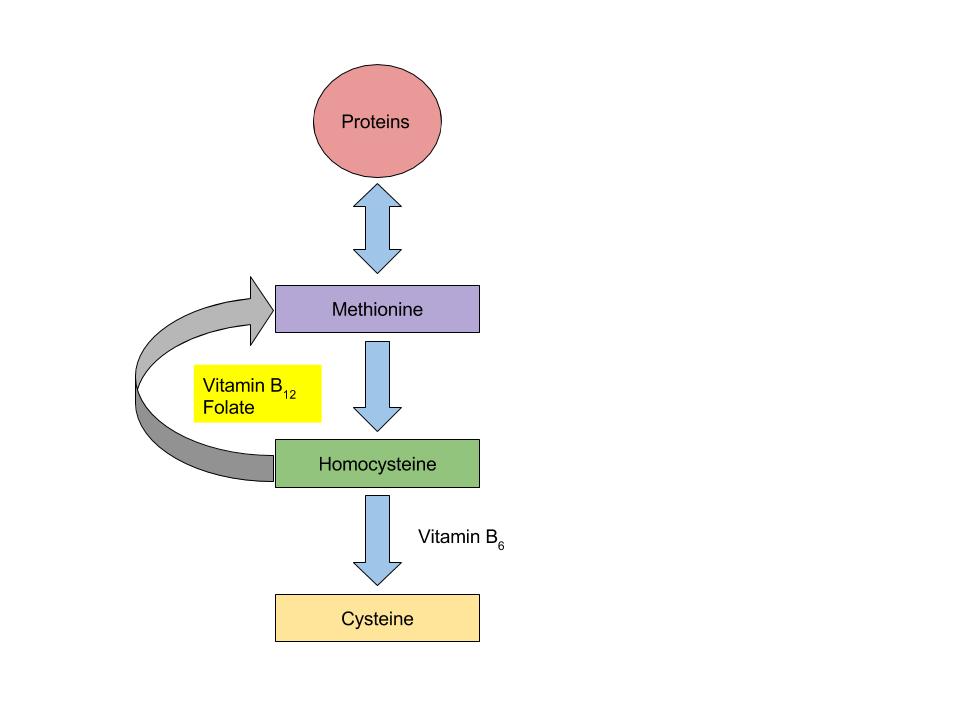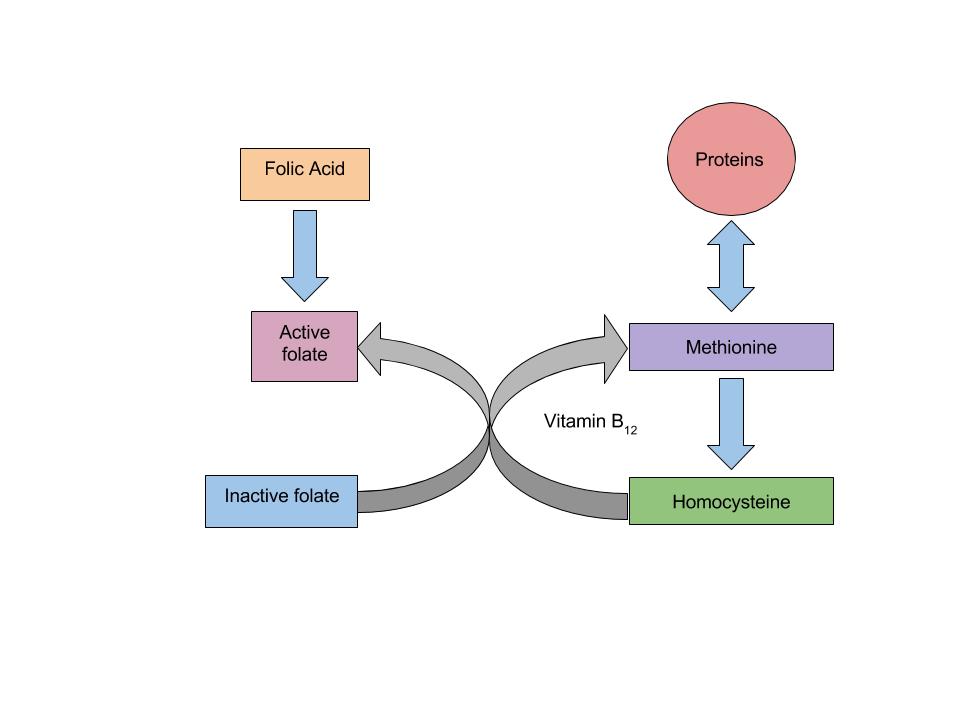Chapter 11: Micronutrients in Metabolism
11.8 Vitamin B12
University of Hawai‘i at Mānoa Food Science and Human Nutrition Program
Vitamin B12 (Cobalamin)
Vitamin B12 contains cobalt, making it the only vitamin that contains a metal ion. Vitamin B12 is an essential part of coenzymes. It is necessary for fat and protein catabolism, for folate coenzyme function, and for hemoglobin synthesis. An enzyme requiring vitamin B12 is needed by a folate-dependent enzyme to synthesize DNA. Thus, a deficiency in vitamin B12 has similar consequences to health as folate deficiency. In children and adults vitamin B12 deficiency causes macrocytic anemia, and in babies born to cobalamin-deficient mothers there is an increased risk for neural-tube defects. In order for the human body to absorb vitamin B12, the stomach, pancreas, and small intestine must be functioning properly. Cells in the stomach secrete a protein called intrinsic factor that is necessary for vitamin B12 absorption, which occurs in the small intestine. Impairment of secretion of this protein either caused by an autoimmune disease or by chronic inflammation of the stomach (such as that occurring in some people with H. pylori infection), can lead to the disease pernicious anemia, a type of macrocytic anemia. Vitamin B12 malabsorption is most common in the elderly, who may have impaired functioning of digestive organs, a normal consequence of aging. Pernicious anemia is treated by large oral doses of vitamin B12 or by putting the vitamin under the tongue, where it is absorbed into the bloodstream without passing through the intestine. In patients that do not respond to oral or sublingual treatment vitamin B12 is given by injection.
Vitamin B12 Relationship with Folate and Vitamin B6

Vitamin B12 and folate play key roles in converting homocysteine to amino acid methionine. As mentioned in Section 11.5, high levels of homocysteine in the blood increases the risk for heart disease. Low levels of vitamin B12, folate or vitamin B6 will increase homocysteine levels, therefore increasing the risk of heart disease.

When there is a deficiency in vitamin B12 , inactive folate (from food) is unable to be converted to active folate and used in the body for the synthesis of DNA. Folic Acid however (that comes from supplements or fortified foods) is available to be used as active folate in the body without vitamin B12 .Therefore, if there is a deficiency in vitamin B12 macrocytic anemia may occur. With the fortification of foods incorporated into people’s diets, the risk of an individual developing macrocytic anemia is decreased.
Dietary Reference Intakes
The RDAs and ULs for different age groups for Vitamin B12 are listed in Table 11.81 “Dietary Reference Intakes for Vitamin B12“.
Table 11.81 Dietary Reference Intakes for Vitamin B12[1]
| Age Group | RDA Males and Females mcg/day |
| Infants (0–6 months) | 0.4* |
| Infants (7–12 months) | 0.5* |
| Children (1–3 years) | 0.9 |
| Children (4–8 years) | 1.2 |
| Children (9–13 years) | 1.8 |
| Adolescents (14–18 years) | 2.4 |
| Adults (> 19 years) | 2.4 |
| Pregnancy | 2.6 |
| Lactation | 2.8 |
| *denotes Adequate Intake | |
Dietary Sources
Vitamin B12 is found naturally in animal products such as fish, meat, poultry, eggs, and milk products. Although vitamin B12 is not generally present in plant foods, fortified breakfast cereals are also a good source of vitamin B12. For the vitamin B12 content of various foods, see Table 11.82 “Vitamin B12 Content of Various Foods”.
Table 11.82 Vitamin B12 Content of Various Foods[2]
| Food | Serving | Vitamin B12 (mcg) | Percent Daily Value |
| Clams | 3 oz. | 84.1 | 1,402 |
| Salmon | 3 oz. | 4.8 | 80 |
| Tuna, canned | 3 oz. | 2.5 | 42 |
| Breakfast cereals, fortified | 1 serving | 1.5 | 25 |
| Beef, top sirloin | 3 oz. | 1.4 | 23 |
| Milk, lowfat | 8 fl oz. | 1.2 | 18 |
| Yogurt, lowfat | 8 oz. | 1.1 | 18 |
| Cheese, swiss | 1 oz. | 0.9 | 15 |
| Egg | 1 large | 0.6 | 10 |
- Dietary Fact Sheet for Health Professionals: Vitamin B12. National Institute of Health, Office of Dietary Supplements. https://ods.od.nih.gov/factsheets/VitaminB12-HealthProfessional/. Updated December 22, 2022. Accessed August 2, 2023. ↵
- Ibid. ↵
Catabolism refers to catabolic metabolic pathways. Catabolic pathways break down polymers into their monomers, releasing energy
Anemia is when a person's ability to carry oxygen throughout the body is lowered, due to a lack of red blood cells and/or hemoglobin.
Absorption is the process of getting nutrients from the digestive tract into the blood or lymph.
Helicobacter pylori (H. pylori) is a spiral-shaped bacterium that penetrates the stomach lining , making the tissue more susceptible to the damaging effects of acid, leading to the development of sores and ulcers.
Organs are a group of tissues arranged in a specific manner to support a common physiological function.

